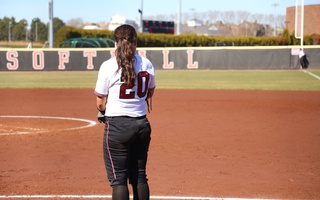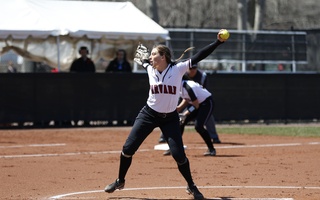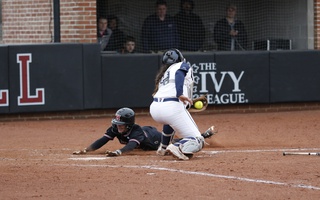Ahead of the 2017 season, Crimson softball was just beginning offseason practices in the bubble over Harvard Stadium. Junior infielder Meagan Lantz stepped up to serve as a baserunner in a defensive situation drill. She sprinted from home to first, cutting to her right once she had run through the bag. She immediately felt something was off—later testing revealed that she had torn her ACL in her right knee.
“At the time I didn’t think it was a complete tear,” Lantz said. “I didn’t think I’d be out for the season. It was shocking, but it kind of just goes to show you how precious every moment is on the field and how you can’t take anything for granted, and that definitely taught me a lot.”
All of a sudden, one of Harvard’s key 2016 contributors was done for the season. In her rookie year, Lantz hit .323/.375/.577 with seven home runs, 34 runs scored, 37 RBI, and 10 steals. Now, Harvard would have to replace her production as it aimed to maintain its standing as one of the Ivy League’s top teams.
“She’s such a competitive athlete,” coach Jenny Allard said. “She absolutely loves to play, and to have that happen within the first week of winter training was devastating to her. She had never ever been injured, so your heart breaks when someone’s going to have a season-ending injury to the level that she did.”
In the meantime, Lantz’s role on the team evolved. She became a de facto team manager and a leader on the bench, helping coaches with various tasks in games and practices and motivating her teammates.
According to Allard, support from injured athletes is crucial in making things happen behind the scenes. This year, senior Morgan Macchiarulo took on a similar role.
“I think it made me realize how important every single member of this team is,” Lantz said. “It doesn’t take one or two people to be really key to a team’s success. It really is a full team effort, and everyone is really needed.”
Once the season came to a close, Lantz returned home to Parkland, Fla., to ramp up her rehab process. First she had to work her way back to walking normally, regaining full extension and range of motion in her knee. After that, the area around the knee had to be strengthened as much as possible to avoid further injury.
{shortcode-9e7f568a9f4e63d8e2ed08bfd806f285127251e0}
When Lantz returned to campus, she worked closely with the softball coaching staff, team trainers, and the strength and conditioning staff. Approximately six to nine months after the initial ACL injury is when athletes can typically return to their sport, and Harvard trainers gradually guided Lantz back into softball mode, instilling patience the whole way.
From the outset of this season, Lantz did not show any hesitation or ill effects from the injury. She played in all 39 of the team’s games, and she even made a full-time switch full to a position that demands more lateral movement. She split time between third and second in her freshman campaign, but she moved over to second base more permanently this year following the emergence of junior third baseman Erin Lockhart.
{shortcode-b96c1956e269ab2a4d615853e279eedc47528e5e}
“I think there were definitely some nerves coming back,” Lantz said. “We opened preseason in Florida. I’m from Florida, so it was nice to be back in my home state, and we were playing on fields that I had played on when I was growing up, so I think that kind of gave a bit of a comfort level. Once I got past the initial nerves and butterflies, it was just business as usual being on the field with Harvard softball.”
Lantz—along with teammates Maddy Kaplan, Katie Duncan, and Rhianna Rich—was named an All-Ivy player for her 2018 campaign. The junior hit .358/.405/.533 with four homers, a team-leading 10 doubles, 21 runs, and 20 driven in.
“Just her return to the level she’s gotten herself to, following such a significant injury, is just so impressive,” Allard said. “It speaks to her determination, it speaks to her effort, it speaks to her drive and her desire to come back and play the game she loves. She, I think, came back even stronger.”
Perhaps most impressive, though, were her 16 stolen bases. That mark was second in the Ivy League, behind only Yale’s Shelby Kennedy, who had 21 in 26 attempts. Lantz, however, was only caught twice.
According to Rich, a lot of teams do not expect a hitter in the third spot in the lineup to be exceptionally fast. Getting runners into scoring position for the power hitters that follow in the order, such as Lockhart and sophomore first baseman Olivia Giaquinto, is key.
“I didn’t think I’d be stealing a lot, but when coach gives you the steal signal, you’ve just got to go with it and do what you can to slide into the base and make it work,” Lantz said. “But it’s been fun. I definitely have enjoyed being a little more aggressive on the bases.”
Rich, who has 25 career steals and is the team’s leadoff hitter, thinks she still has a slight edge over Lantz in terms of speed.
“I think I might be a little faster just based off of testing that we’ve done,” said Rich with a laugh. “But we’re different types of athletes. She’s definitely the fastest right-hander we have.”
Though Lantz may or may not be able to claim the distinction of Harvard softball’s fastest runner, she reaped greater rewards this season: a return to her outstanding freshman year form and a chance to compete in the NCAA tournament.
“She is one of the hardest workers on our team and she worked day in and day out to get back to where she was,” Rich said. “We all are super proud of her and what she’s been able to accomplish, and I think everyone knew she had the physical capacity to get past her injury. She’s such a strong athlete and she has this determination. With these types of injuries, it’s just about being mentally strong enough to push past it, and she was.”
—Staff writer Jack Stockless can be reached at jack.stockless@thecrimson.com.



